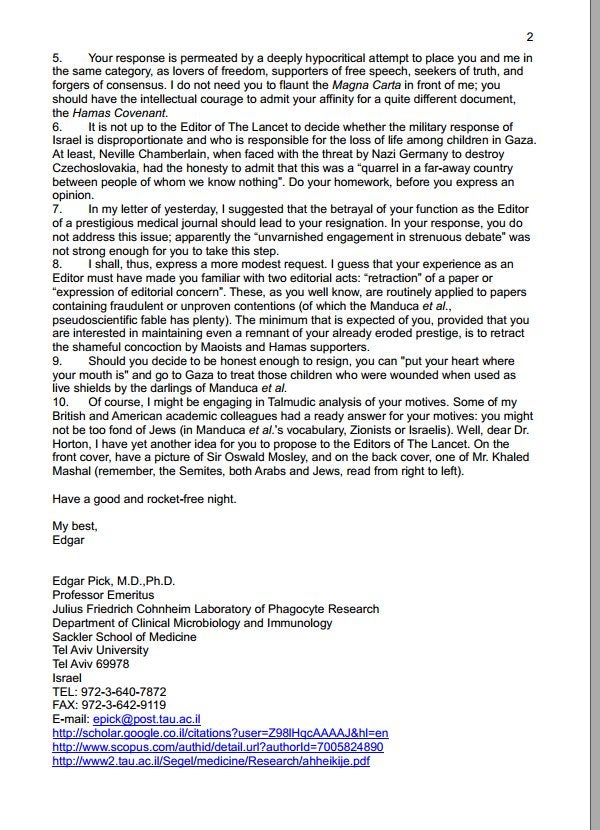Response to the Lancet by Prof Edgar Pick [Tel Aviv]
Zie eerst brief hieronder en dan antwoord aan Horton.
PDF is niet mogelijk dus als PNG verstuurd


From: Edgar Pick <epick@post.tau.ac.il>
Date: Wed, Jul 30, 2014 at 1:00 AM
Subject: Edgar Pick - The Lancet Editor replies and Edgar Pick responds
To
July 30, 2014
Dear friends,
As most of you know, the "Lancet Affair" is gaining tremendous momentum. It might become the Dreyfus affair of scientific publishing.
On July 28, the Editor of The Lancet, Dr. Richard Horton sent the following "friendly" reply (blue font).
I responded by the attached letter (pdf).
Edgar Pick, M.D.,Ph.D.
Professor Emeritus
Julius Friedrich Cohnheim Laboratory of Phagocyte Research
Department of Clinical Microbiology and Immunology
Sackler School of Medicine
Tel Aviv University
Tel Aviv 69978
Israel
TEL: 972-3-640-7872
FAX: 972-3-642-9119
E-mail: epick@post.tau.ac.il
------------------------------------------------------------
July 28, 2014
Dear Dr Pick - Many thanks for your email and letter. You and I come from the tradition of western medicine exemplified by the science of human disease so well embodied in the work of Rudolf Virchow, who emphasised so eloquently that politics is medicine writ large. The entire discipline of public health is founded on this idea. We see the interplay of politics and health everyday. It is something we should not shrink from, but embrace. It is a fact of medical life.
We are also both fortunate that our countries are founded on the notion of freedom of speech. Many of our predecessors have fought and lost their lives for this principle. The belief that an unvarnished engagement in strenuous debate enables us to get closer to the truth seems an important idea to defend. I fully respect your right to disagree with The Lancet (and with me). Indeed, I welcome it. Difference and debate are what improves our respective societies. In the case of the current conflict in Gaza, we believe that the opinions of medical colleagues on all sides of the issue offer an important opportunity to forge, if not consensus, then better and more precise questions about what is right, what is wrong, and what should be done.
All I can say at present is that the disproportionate loss of life among children and women in Gaza is telling us something important about the disproportionality of force being used by one side in this conflict. This seems to me a matter that should indeed exercise the conscience of every physician.
My best, Richard
Richard Horton
richard.horton@lancet.com